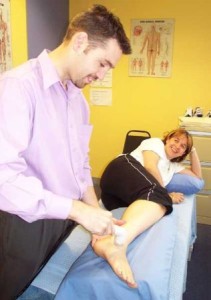 While it isn’t the most common way to enter private practice, some physiotherapists choose to buy existing clinics to avoid the hassles associated with most start-ups and home-based alternatives. Perhaps you’ve saved and invested wisely over the years or have pooled enough capital with colleagues to make a down payment for your dream partnership. Together with some “love” money, i.e. contributions from family, friends, etc. you are well on your way to a profitable and fulfilling business life, right?
While it isn’t the most common way to enter private practice, some physiotherapists choose to buy existing clinics to avoid the hassles associated with most start-ups and home-based alternatives. Perhaps you’ve saved and invested wisely over the years or have pooled enough capital with colleagues to make a down payment for your dream partnership. Together with some “love” money, i.e. contributions from family, friends, etc. you are well on your way to a profitable and fulfilling business life, right?
On the surface, this looks like a winning option with a lengthy upside, e.g.:
The actual location of the clinic, equipment and fixtures already exist.
You have a ready-made patient list, meaning that the practice is able to earn income immediately for you.
As a new owner, you can draw on long-established relationships with hospitals, general practitioners, sports facilities, etc. to continue gaining return visits and patient referrals.
Established clinics ideally have a good track record, which will help you finance improvements and future growth.
Key physiotherapists and support staff are in place to ensure business and professional continuity
However, it’s always buyer beware with such a major purchase, so enlist the advice of a trusted accountant, surveyor, evaluator and lawyer to help negotiate a fair price. Certainly, the cost of a preliminary investigation may appear prohibitive but it will be well worth it, regardless of your final decision.
For example, maybe your research uncovers doubts about the practice’s long-term viability. Maybe demographic changes in the neighbourhood do not favour your specialisation or you find that most of the current staff is nearing retirement and are not willing to stay on long enough to ensure a smooth transition from the previous owner.
On the other hand, perhaps you have found a “gold mine” with all the right conditions in place. In this case, the seller may demand a deserved premium and it will depend on your negotiating skills to hammer out a fair price. The same is true for a faltering clinic that you believe can be turned around. Having the necessary skills and confidence to make it work does not mean buying at any price.
The period immediately after confirming intent to purchase is fraught with delicate issues:
- How much to invest on equipment, furniture, etc. in the beginning.
- Respecting the contracts/agreements of existing staffers and getting them onside.
- Retaining key personnel – the departing owner, perhaps? – once you take command.
- Responsibility for outstanding private practice debts at the time of takeover.
- Form an advisory team to help you navigate these and other items that are surely to dominate the early part of your clinic ownership.
(Source: PhysioPulse)
